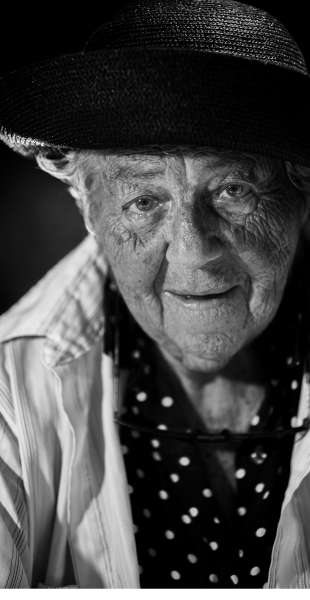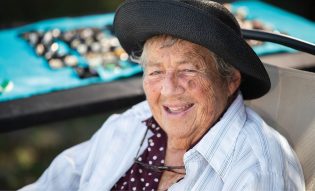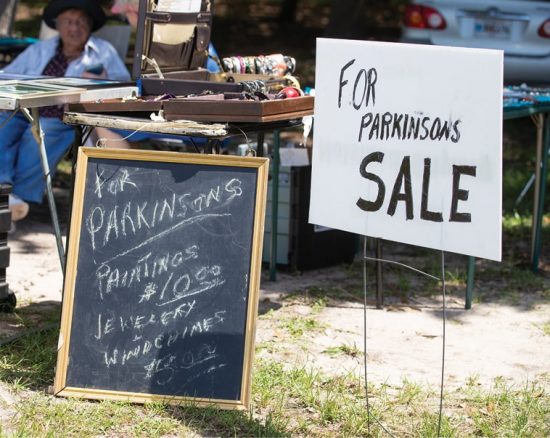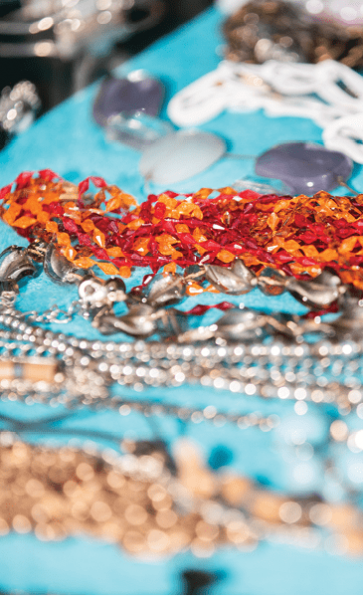An Unbelievable Memory
At 91, Triple Eagle Alice Gerber Still Supporting People with Parkinson’s Disease

Just Another Monday
It was a hot, late-summer day at the Farmers Market in Tybee Island, Georgia. Perched under the protection of a broad-brimmed hat sparkled the bright hazel eyes of Alice Gerber, Ed.D. (’74, ’06,’06). The 91-year-old was cheerfully preparing her stand to sell her paintings, handmade jewelry and art pieces made from recycled materials. All sales benefited the Get Excited and Move (GEM) program for people with Parkinson’s disease Gerber helped found.
Originally from Chicago, Gerber graduated from Northwestern. Then, while visiting relatives in Savannah, she met her future husband, businessman, Marx Gerber.
“My aunt fixed me up on a blind date with Marx,” said Gerber. “I went back home and he called me every evening. It was one of those long distance romances.”
After marrying and beginning a teaching career in Savannah, her knack for helping special education students was discovered. So Gerber went to Georgia Southern for a master’s degree in education.
Then everything changed.
Parkinson’s Disease Struck
In 1980, Gerber’s husband was diagnosed with Parkinson’s disease. Before the diagnosis, the couple traveled the world for years trying everything they could to diagnose the disease and ease the symptoms.
“We didn’t actually get a diagnosis until toward the very end of his life because few people knew what Parkinson’s was and they couldn’t diagnose it like today,” said Gerber.
Infuriated by the lack of information and support, Gerber set about to change things. She helped organize the first meeting of the Savannah Parkinson’s Support Group. Due to Gerber’s relentless drive for more information, she became an expert herself, often teaching health care providers
and caregivers how to best care for Parkinson’s patients.

Back to School at 72
While working with the Parkinson’s group, Gerber realized they all had something in common. That realization changed her life again. At age 72, she wanted to conduct research on Parkinson’s disease.
“So, I went to Georgia Southern and said I’d like to do some research,” explained Gerber. “They said ‘start school tomorrow’ and I said, you’re crazy. I haven’t been in school for 35 years. ‘You start tomorrow and we’ll get somebody to help you.’ They got the head of nursing to help me.”
What Gerber’s research discovered was that many of the Parkinson’s group were born in rural areas, drank well water when they were children and had parents or grandparents involved in agriculture.
“Now, I felt back then that paraquat [a widely used herbicide] in the soil was one of the things that was causing the disease,” said Gerber. “Of course, the ‘experts’ poo pooed me. Today, scientists are sure that paraquat is one of the triggers of Parkinson’s.”
Gerber graduated with a doctorate in educational leadership and administration in 2006.
During the research phase of her doctoral dissertation, Gerber met and began working with the great boxer and Parkinson’s patient, Muhammad Ali, establishing a long-lasting friendship.
“Muhammad Ali was very, very helpful to me with GEM,” said Gerber. “He was kind and did a lot of lovely things to help me financially and otherwise.”


The Whole Story
“That’s the whole story of me and why I’m doing it, how I’m doing it,” said Gerber. “It’s amazing. We started out with seven people in GEM, we’ve got over 300 people in there today. That’s all it takes is one or two people trying.”
Many patrons of the farmers market kept dropping by to purchase her artwork and to chat, remembering her as the teacher they or their children, even grandchildren had known. Unbelievably, Gerber remembered each one of them, their story and the artwork they had previously purchased.
“My paintings are 10 dollars,” said Gerber to a customer. “I sign anything you buy in case I become famous.”
In the Parkinson’s community, Alice Gerber is already famous.
— Liz Walker
